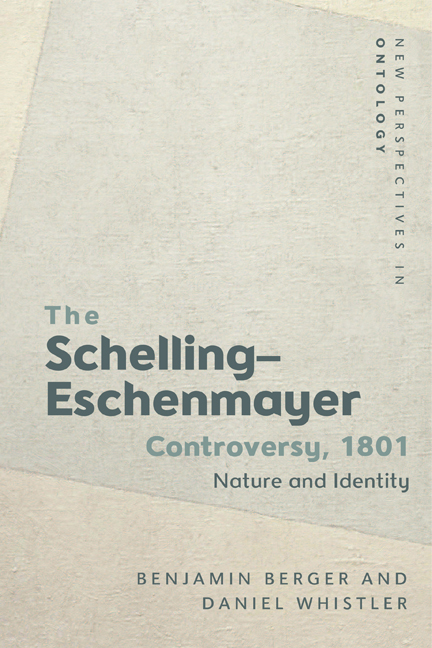Book contents
- Frontmatter
- Contents
- Preface
- Translators’ Note
- Abbreviations
- Introduction: Schelling and Eschenmayer in 1801
- Part I Texts
- Spontaneity = World Soul, or the Highest Principle of Philosophy of Nature
- On the True Concept of Philosophy of Nature and the Correct Way of Solving its Problems
- Part II Commentaries
- 1 Quality
- 2 Potency
- 3 Identity
- 4 Drive
- 5 Abstraction
- Part III Appendices
- Appendix 1 Correspondence, 1799–1801
- Appendix 2 Principles of Nature-Metaphysics Applied to Chemical and Medical Subjects [Extracts]
- Appendix 3 Deduction of the Living Organism [Extracts]
- Appendix 4 Review of F. W. J. Schelling’s First Outline of a System of Philosophy of Nature and Introduction to his Outline
- Notes
- Bibliography
- Index
1 - Quality
Published online by Cambridge University Press: 03 October 2020
- Frontmatter
- Contents
- Preface
- Translators’ Note
- Abbreviations
- Introduction: Schelling and Eschenmayer in 1801
- Part I Texts
- Spontaneity = World Soul, or the Highest Principle of Philosophy of Nature
- On the True Concept of Philosophy of Nature and the Correct Way of Solving its Problems
- Part II Commentaries
- 1 Quality
- 2 Potency
- 3 Identity
- 4 Drive
- 5 Abstraction
- Part III Appendices
- Appendix 1 Correspondence, 1799–1801
- Appendix 2 Principles of Nature-Metaphysics Applied to Chemical and Medical Subjects [Extracts]
- Appendix 3 Deduction of the Living Organism [Extracts]
- Appendix 4 Review of F. W. J. Schelling’s First Outline of a System of Philosophy of Nature and Introduction to his Outline
- Notes
- Bibliography
- Index
Summary
Schelling's On the True Conceptgives a somewhat misleading picture of what is at stake in his disagreement with Eschenmayer: it relegates to the end of the essay many of the specific problems within philosophy of nature that propelled their dialogue, so as to, instead, foreground the more global problem of the relation between the philosophy of nature and transcendental idealism. This is not to downplay the conclusions Schelling reaches concerning the priority of philosophy of nature; rather, our point is that On the True Conceptobscures both the importance of the specific problems in the philosophy of nature and their connection to Schelling's views regarding the nature of reality and the philosopher's access to it. In this chapter, we provide a summary of the longstanding disagreements within the philosophy of nature that led to On the True Concept(and ultimately to the identity philosophy), focusing on the specific problem that ignites the controversy in 1799: the problem of constructing material qualities. Indeed, for Jantzen, everything ‘turns on’ this problem of quality. By charting Eschenmayer and Schelling's interactions on material quality from 1797 to early 1801, we hope to provide some of the intellectual context to their arguments in Spontaneity = World Souland On the True Concept.
We also hope thereby to indicate more broadly how much of the subsequent development of German Idealism arises out of these debates on quality. The various nature-philosophical attempts devised to best explain the diversity of material qualities in the natural world become, from 1801 onwards, part of the theoretical apparatus of the metaphysics of absolute idealism. For example, we attempt to show in Chapter 3 that, in Leistner's words, ‘the question of the extent to which the mathematical construction of matter can construct or derive the specific quality of matter from quantitative proportions of two fundamental forces [is not] just an exotic problem in philosophy of nature’, but also concerns ‘the basic theoretical question of the original genesis of difference from identity’. From this perspective, it becomes plausible that the philosophy of nature ought – at least, on occasion – to have systematic priority for contemporary readers of the idealist tradition. It would not, then, be an abstruse, marginal supplement to idealist philosophy, of interest only to those scholars of German Idealism working on the concept of nature.
- Type
- Chapter
- Information
- The Schelling-Eschenmayer Controversy, 1801Nature and Identity, pp. 65 - 93Publisher: Edinburgh University PressPrint publication year: 2020

